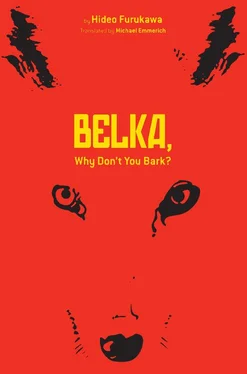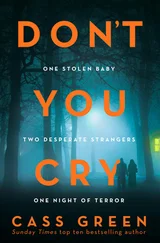And all this effort aimed at taking out a single target—a single person, the prey—was only basic training. It was just an energetic warm-up.
Half an hour into training, the old man had the dogs put their training to use.
This was the real stuff.
Ten dogs were assigned a four-story building, one of the many in this deserted Dead Town, and the command was given. Take it. The dogs scattered in all directions, rehearsed the motions of herding people into the building, cornering them. The dogs scaled the stairs, sprang through doors and windows, in and out, all the while barking. They moved in a sort of formation, in collaboration, like three sheepdogs guiding a herd of several dozen sheep. They acquired the ability to “cleanse” a building within a set time frame.
They practiced jumping. The old man had them wait at attention along one of the roads that crisscrossed the Dead Town. A car came driving along, and they jumped on top, jumped over. Or they ran around it. They forced the driver to slow down, jumped onto the hood. This, ultimately, was their goal. To block the windshield, obscure the driver’s view, make the driver lose control.
To cause havoc in urban environments.
To do battle in the cities.
Here in the Dead Town, they were learning. Little by little.
The old man handled the dogs so masterfully it seemed, looking on, as though he were not merely training the dogs, but honing their intellect. Little by little. Gradually each dog came to understand its particular specialty. If a ladder stood leaning against a wall, the dogs darted up it. They also learned to climb trees. They would wait in the foliage, keeping still, biding their time, until their prey came along, until a person walked directly underneath, and then they would pounce, they would attack.
This morning, they were learning to carry burning branches, torches. For seven days now they had been engaged in this task. Learning to be arsonists.
The dogs learned “subversive activities.”
All at once, the twenty-some-odd dogs froze. They turned and faced the same direction, growling. In warning. An intruder had appeared on the field. The old man commanded them, with a single clipped word, stop. Don’t attack. A few of the dogs kept growling, so the old man called them by name.
“Asha, down! Ptashko, down! Ponka, down!”
Each dog obeyed instantly as its name was called.
“Aldebaran!”
One last dog, scolded, fell silent.
Now all the dogs were crouching on the ground, staring at the intruder, at the girl who had put on her coat and come outside. She stood seven or eight meters away from the old man.
“What, are those fucking dog names? Call ’em Pooch or something,” she spat.
In Japanese.
Easy, stay there, the man ordered the dogs in Russian.
They understood.
What the fuck are you doing? I came to watch you, asshole. Playing around with your dogs. Don’t fucking stop, she said in Japanese.
Well, well, this is a surprise, the old man said, walking over. What is it, little girl? Are you interested in my dogs?
Don’t fucking come near me, gramps, said the girl.
If you like dogs, the old man continued, maybe later I’ll show you the doghouse.
It’s fucking winter out, you senile dick.
There are puppies.
I fucking told you not to come near me. Don’t fuck with me.
But the girl made no move to leave. The old man was right in front of her now, standing still, ready to talk. To have a conversation, in Japanese and Russian, that would communicate nothing. The girl glared up at the old man. The difference between their heights was about the size of an adult dog, foot to shoulder.
You’re quite an interesting little girl, the old man said.
Yeah, fuck you too. You’re probably calling me a brat in Russian, I know. Whatever, senile old dick, the girl replied. Someday I’m gonna fucking kill you.
The old man grinned. Smiled. For real.
“Huh?” the old man exclaimed suddenly. He wasn’t talking to the girl. He had looked away, sensing something. His face was turned up now, he was gazing up into the air, just as the girl was gazing up at him. The four-story building. The deserted building where the ten dogs had been training, learning to herd, to corner. A silhouette on the roof. A dog in outline.
The dog stepped quietly, calmly to the edge.
He was gazing down, it seemed, at the old man and the girl.
Slightly larger than the other dogs, he lacked their youthfulness. That much was clear even at a distance. But he had something else in its place. Authority, a commanding presence. That, too, was clear even at this distance. “Belka,” the old man said.
The dog didn’t respond.
He’s old, really old, the old man told the girl. Same as me. But he’s not deaf.
Once again, the old man called to the dog, somewhat louder. “Belka, why don’t you bark?”
This time the dog replied. Uuoof . Just once, quietly. To the old man and the girl.
By then the girl was looking up at the roof too. All of a sudden, she was pissed. She felt as if the old man had ordered the fucking dog to bark at her, and it had. She was furious.
“Hey, gramps,” she said, ignoring the dog. The old man sensed the forcefulness of her tone. He turned to face her. She looked him straight in the eye and continued, “I fucking hate you more than anything. Fucking Roosky. Drop dead.”
Drop dead , she said. In Japanese. Shi-ne .
The old man paused, as if he were reflecting on what she had said. And then he repeated the sounds of the Japanese word she had spoken.
“SHE-neh.”
“Senile dick. Don’t fucking converse with me.”
Dogs, dogs, where are you now?
Mainland USA, 1957. Fate unites two lineages. On the one hand, the purebred Sumer; on the other, the mongrel Ice. Both were bitches, each having borne more than one litter.
Sumer was gorgeous. Her skull and muzzle were of equal length, et cetera, et cetera—she was the perfect embodiment of the purebred German shepherd standard. She hadn’t lost her looks, even now that she was getting old. There she was, in a cage, in a kennel, in the suburbs of Chicago, Illinois.
Ice was frightening. Her father had been a Hokkaido dog, her mother a Siberian husky, and one of her grandmothers was a Samoyed. She had a face like a fox’s with brilliant blue eyes, a sturdy bone structure, hair on her back that the wind whipped like a mane. She looked odd, even eerie, resembling the standard image of no breed. No one owned her. She roamed freely across a wide swath of Minnesota, bound by nothing. Until they came after her with rifles.
Sumer bore puppies who were contenders to the throne. Any number of them, blessed creatures with everything going for them, expected by dint of their distinguished lineage to dominate the dog shows. She was getting on in age, but the planned mating continued; she got pregnant and gave birth again and again and raised her pups until they were four or five months old. She was, in short, a mother.
Ice obeyed her instincts, mating with pet dogs in residential developments when she was in heat, absorbing into her own bloodline the strengths of dogs whose looks and personalities suited hers. The puppies she gave birth to were another step away from purity. Their looks were unclassifiable; they had a dangerous, untamed strength. Ice led her children, and she led those of the other dogs in her pack. Five dogs from the team that had once pulled a sled in Far North Alaska and their children. They were all “wild dogs” now, regarded with unease by the humans, and she was the top dog. The leader of the pack.
A beautiful German shepherd who was, above all, a mother.
A freakish mongrel who was a mother, yes, but also a queen.
Читать дальше












